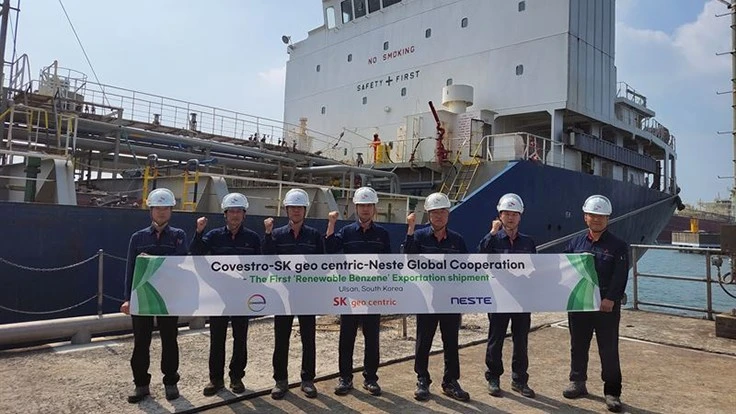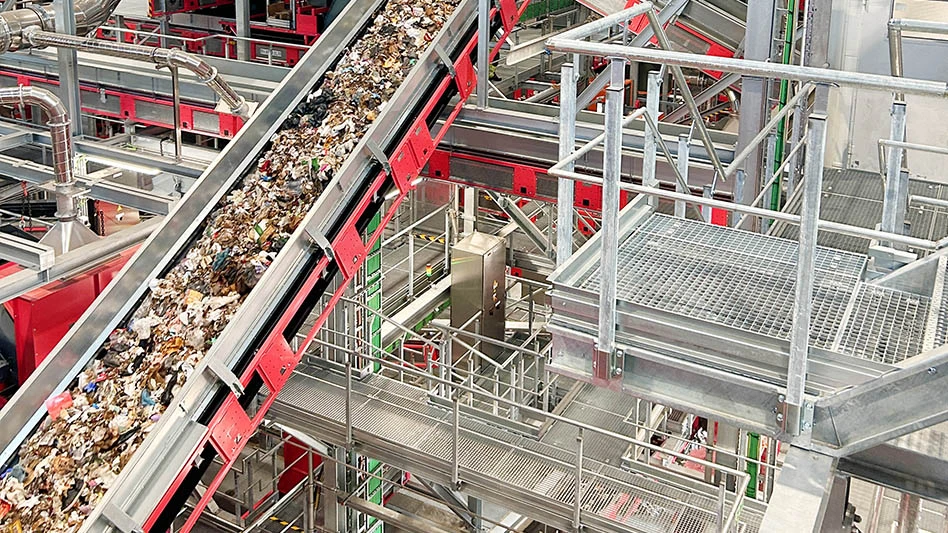
Photo courtesy of Neste.
Finland-based Neste Oyj, German-based Covestro and South Korean petrochemical company SK geo centric say they are now producing and exporting a polyurethane raw material made from 100 percent renewable raw materials such as waste and residue oil and fats.
The cooperative effort is creating Neste RE, which the companies call an International Sustainability and Carbon Certification (ISCC)-certified feedstock for polymers and chemicals made from 100 percent renewable raw materials, including waste fats, oils and grease (FOG).
SK geo centric is processing this feedstock into benzene at the company’s facilities in South Korea. That material is then supplied to Covestro to use as raw material for methylene diphenyl di-isocyanate (MDI) at its site in Shanghai, China.
The companies describe MDI as “a key raw material for the manufacture of rigid polyurethane foam, which often is used as insulating material for buildings and in the cold [products shipping] chain helping to save CO2 emissions and reduce energy consumption during its product life.”
The cooperation marks the start of possible future collaborations between the three companies aimed at replacing fossil feedstocks with more sustainable ones in the production of polymers and chemicals in the Asia-Pacific region and beyond.
“With renewable solutions available, we are now entering the phase of scaling up their usage in the chemical industry,” says Mercedes Alonso, an executive vice president at Neste, which is involved in another large-scale renewable products effort in Singapore. “This will be crucial in replacing the vast amounts of fossil resources the industry is currently depending on. To make this ramp-up a success, we’ll need to establish collaborations along the value chain – and this one between three sustainability-minded partners is a prime example of how the industry can do just that.”
Replacing crude oil-based feedstock with Neste RE provides a significant reduction in greenhouse gas (GHG) emissions, say the companies, “thereby improving the carbon footprint of the polyurethane raw materials produced by Covestro and of downstream industries.”
“I am much pleased that through this collaboration we continue to ramp up the market for such sustainable alternative materials,” says Sucheta Govil, chief commercial officer of Covestro. “This enables us to supply our customers in Asia-Pacific with more sustainable MDI based on mass-balanced raw materials.”
Govil continues, “Using such materials is attractive because it will also help them achieve their climate goals. Another core benefit of this line of products is that it is a technical drop-in solution that our customers can use immediately without a major changeover in their plants.”
Woohyuk-Choi, a vice president at SK geo centric, says “We are delighted to ship and export our first renewable-benzene produced with 100 percent renewable Neste RE feedstock. SK geo centric will actively work with Covestro and Neste as we mark the first collaboration of this kind in the Asia-Pacific region. We remain committed to expanding this cooperation.”
Under a strategy it calls “Green for Better Life,” SK geo centric has announced a target to become “net zero” before 2050. The company says it will drive its business transformation by expanding its renewable products portfolio, and that it will “respond to increasing global demands in the market by leveraging the strong synergies between collaboration partners.”
Latest from Waste Today
- US Senate backs reduced cuts to EPA
- ELV Select Equipment, Reworld aid NYPD in secure firearm disposal
- Waste Connections announces Q2 results
- Returnity and Cosmoprof to address reusable bag waste
- SWANA releases report on aging WTE facilities
- New economic assessment reveals cost benefits of California’s SB 54
- Premier Truck Sales & Rental opens new facility
- TeknTrash Robotics, Sharp Group partner on humanoid robot pilot





